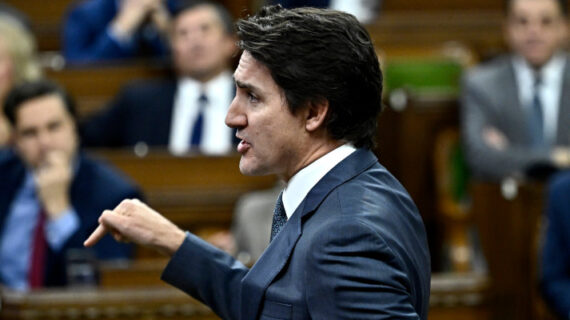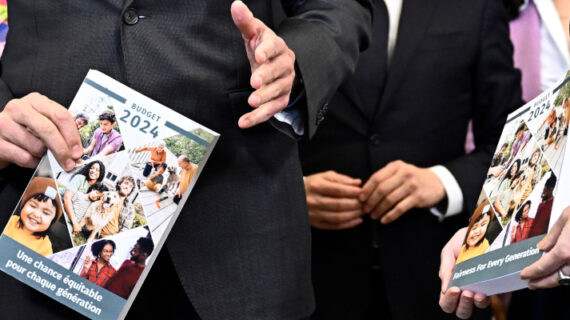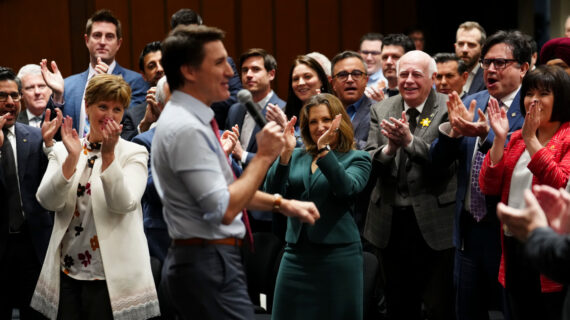Welcome to The Hub’s Federal Election 2021 Policy Pulse, where we’ll be tracking all the policy announcements from the major parties, with instant analysis from our crew of experts.
With the election scheduled for Sept. 20, we’ll be monitoring 36 days worth of policy ideas, so watch out each morning for the day’s live blog where we’ll be tracking every announcement as it happens.
4:15 p.m. — If you’re interested in foreign affairs, tonight is the only chance to hear the leaders debate it
By Amal Attar-Guzman, The Hub’s associate editor
At tonight’s French-language debate, five major topics will be debated:
- Indigenous peoples and cultural identity
- The cost of living and public finances
- The environment and climate change
- Justice and foreign policy
- The pandemic and health care
And in tomorrow’s English-language debate, foreign policy is the only topic out of the five that will not be debated by the five party leaders.
That means if you are interested in Canadian foreign policy and foreign affairs, you will have to tune in to tonight’s debate.
Here are two main foreign policy issues to look out for:
- China
Labour Day weekend marked the 1,000th day since the two Michaels — Michael Spavor and Michael Korvig — were imprisoned in China. Around 150 Canadians in Ottawa attended the “March for the Michaels” to mark the day.
Foreign Affairs Minister Marc Garneau issued out a statement on the sombre milestone, expressing the unjust detention of the two Michaels and demanding that they “must come home.” Because of the milestone and its acknowledgment from the government and party leaders, issues surrounding China-Canada relations should be at the top of the agenda for the foreign affairs segment of the debate.
- Afghanistan
Afghanistan will also surely be a big issue tonight. The same day the writ dropped, Kabul fell. From mid-August towards the end of the month, CAF were deployed in the Afghanistan for evacuation efforts. More than 3,700 people got evacuated and the government committed that 20,000 Afghans will be resettled in Canada.
The government’s response and evacuation efforts has been criticized all throughout the crisis. In fact, the Globe and Mail’s editorial board has criticized Canada’s response in a piece published today. Foreign Affairs Minister Marc Garneau has even accepted such criticism on Canada’s response as fair. With 1,250 Canadians, permanent residents and Afghans with ties to Canada still remaining in Afghanistan, Canada’s role and efforts in Afghanistan should be scrutinized tonight.
If you don’t speak French, do not fret. Live translations will be available on various different formats.
3:00 p.m. — Boosting the Canada Workers Benefit will improve the lives of workers and their families
By L. Graeme Smith, The Hub’s content editor, and Sean Speer, The Hub’s editor-at-large
Both the Liberals and Conservatives have made promises to expand and improve the Canada Workers Benefit in the campaign. Most recently, Conservative Party leader Erin O’Toole profiled his party’s plan to double the CWB which would increase the maximum benefit to $2,800 for individuals and $5,000 for families.
The Conservatives characterized the increase as the equivalent of a $1 dollar per hour raise for low-income Canadian workers earning between $12,000 and $28,000 annually per year.
The Conservative policy backgrounder doesn’t provide any estimates or analysis on the possible effects on poverty rates or the long-term outcomes for children in Canada, but new research from the United States may provide some window into its broad-based impact.
A bit of a background: The CWB is broadly modelled on the Earned Income Tax Credit (EITC) in the United States, which was enacted in 1975 during the Ford administration and has since been expanded on multiple times, with support from both Democrats and Republicans.
Because the EITC has been around much longer than the CWB, the empirical research, including its anti-poverty effects and benefits for children, is much richer. Consider the following:
- A 2019 study, for instance, estimated that in 2018 the EITC lifted about 5.6 million people out of poverty, including about 3 million children.
- The EITC is directly connected with positive employment outcomes, such as encouraging large numbers of single parents to enter the workforce, contributing to higher wage growth, and even resulting in higher social security contributions and benefits. It also drove a 4-percentage point rise in mothers’ employment.
- More than 60 percent of those who received the EITC between 1989 and 2006 did so for only a year or two at a time.
- Research suggests that EITC contributes also to a broader range of benefits for children living in these households. Increased EITC payments have been associated with reduced psychological stress, improved physical health, and increased use of prenatal care among low-income expectant mothers. These benefits were, in turn, passed along to babies, who were less likely to have low birth weights—a risk factor for health problems later in life.
- Children in households that experienced increases in income from the EITC have seen improved math and reading achievement scores. These income boosts are also linked with increases in high school graduation and college attendance rates, as well as later earnings.
The upshot: Canada’s political consensus in support of the CWB, like the American consensus in favour of the EITC, seems rooted in a clear set of evidence that these types of targeted income supplements for low-income workers can produce significant short- and long-term benefits for the affected worker and his or her family.
1:00 p.m. — Two big francophone issues that could feature in tonight’s French-language debate
By Antonia Maioni, a political science professor at McGill University
A week in politics is a long time, as we know. Tonight’s second French-language debate could reflect that. There are plenty of policy issues that raised hackles in the first debate last week — child care, gun control — but there are also a couple of non-scripted events of the past few days reported in francophone media that may have particular resonance in Quebec.
The “book-burning” episode at an Ontario school commission targeted French “bande-dessinées” (comic books) such as Tintin and Astérix that, while obviously carrying plenty of outdated baggage, are part of the fabric of francophone culture. While this project has been roundly denounced by all party leaders, it still leaves an opening for some push and pull on questions of reconciliation and different political means by which to achieve it.
And, more language wars could be looming. In addition to the federal election, municipal elections are underway in Quebec. A candidate for former mayor Denis Coderre’s party, who is also chair of the English Montreal School Board, was shown the door for his active opposition to a major language reform effort that the Quebec government wants to enact to strengthen provincial language laws.
The EMSB is urging the feds to refer Bill 96 to the Supreme Court in the hopes it will be declared unconstitutional. But francophone Quebecers are resoundingly in favour of enhanced language protection, and they will be watching how federal party leaders react to what Premier Legault has labelled a “radical” response from the English-language community.
11:30 a.m. — The Canada Workers Benefit represents rare consensus on a benefit with a pro-work bias
By Sean Speer, The Hub’s editor-at-large
Over the weekend, Conservative Party leader Erin O’Toole announced that his party would double the Canada Workers Benefit (CWB). (He previously announced that the Conservatives would also double the disability supplement in the CWB.)
The design of the CWB is a bit complex and wonky. Most Canadians are probably not familiar with it. It’s still a relatively small program: Only about 1.4 million people currently claim the CWB each year.
The basic idea is to provide an income supplement for low-income workers for two main reasons: (1) to ensure that the trade-off between employment income and public benefits doesn’t leave workers and their households worse off and (2) to boost the market wages of the working poor.
One might think of the CWB as a basic income with a pro-work bias. It represents in this sense a useful synthesis of the Left’s concern for people’s material needs and the Right’s understanding of the non-material benefits of work.
It’s perhaps no surprise therefore that the CWB was enacted by the Harper government and subsequently expanded by the Trudeau government with ongoing NDP support. In this election, both the Conservatives and Liberals have committed to further improvements — including automatic enrollment and increasing the frequency of CWB payments.
This political consensus in favour of a federal anti-poverty efforts that tilt in favour of work and self-actualization is a positive development.
As University of Victoria economist Rob Gillezeau and I wrote in Policy Options in 2016: “That the WITB has become a point of ideological convergence represents a positive nod in the direction of broad support for social mobility and for evidence-based policy.”
10:30 a.m. — Before looking at foreign competition for Canadian telecoms, we need to solve some structural problems first
By Vass Bednar, contributor at The Hub
The Conservatives recently announced a plan to lower cell phone bills.
While O’Toole acknowledged that, “a big reason for pricey cell phone bills is a lack of competition,” as I have described, there are significant structural problems that impede more robust competition in the telecom business. The very composition of how we deliver telecom — allowing providers to compete on both facilities and services — has inherent tensions.
The O’Toole pledge promises to allow international telecommunications companies to provide services to Canadian consumers. I believe that suggesting we infuse foreign telecoms into the landscape without addressing the structures that limit the terms of competition is just recycling an old idea. As it stands, a foreign company can buy a Canadian telecom if they have less than 10 percent of the market and there is only a cap on foreign players growing through mergers and acquisitions.
Further, asking new providers to potentially build their own networks is economically inefficient. Incentivizing telcos to share their networks with smaller, independent providers will do more to help provide Canadians with more choice and lower prices.
Experts and advocates have been clear that one of the most powerful interventions in the telecommunications space would be a pledge to reverse the 2021-181 CRTC decision in order to revert back to the evidence-based 2019 broadband wholesale rates. Another bold move would be to allow Canadian companies access to the cell phone market via MVNOs (mobile virtual network operators) like Data On Tap Inc.
Competition issues can be challenging to talk about in simple terms. The general policy space is not well understood and can be difficult to have a common conversation about. The barrier(s) to entry in the telecommunications space are slightly higher, given that it is doubly regulated by the Canadian Radio-television and Telecommunications (CRTC).
Promising to lower cell phone bills isn’t a new idea, and the potential tactics to accomplish this are in dispute. Last election, the Liberals put forward their own vision to lower cell phone bills in 2019. The Government of Canada now reports on this quarterly; but there are a lot of empty boxes on the tracking sheets. Both the Liberals and the Conservatives are proposing a “use it or lose it” approach to purchasing wireless spectrum, which is something the UK and the US has adopted and that then-Minister of Industry James Moore cautioned in 2013.
It may be the wrong overall approach, but interrogating the factors that influence cell phone and internet prices is the right idea. The O’Toole platform speaks to competition issues and opportunities in the most direct way of all the party platforms. Keeping all of these proposals open to intellectual competition and inputs will be critical to refining their potential approach and achieving more meaningful policy action(s).
8:30 a.m. — Allowing foreign telecoms to compete in Canada is not a silver bullet, but it’s a step in the right direction
By Sean Speer, The Hub’s editor-at-large
Yesterday’s announcement by Conservative Party leader Erin O’Toole on liberalizing foreign ownership restrictions in the country’s telecommunications sector reflects an ongoing policy debate dating back to when now-People’s Party leader Maxime Bernier was industry minister in the Harper government.
It’s easy to forget that before Bernier was a polemical populist calling for a “revolution over tyranny”, he was a quirky yet conventional libertarian whose tenure as industry minister represented a short-lived attempt to free up the telecommunications sector from a distortionary combination of heavy-handed intervention and protectionism.
In 2006, then-minister Bernier issued a directive to the Canadian Radio-television and Telecommunications Commission requiring that it “rely on market forces to the maximum extent feasible” and “when relying on regulation, [to] use measures that are efficient and proportionate to their purpose and that interfere with the operation of competitive market forces to the minimum extent necessary.”
He described the underlying policy thinking of the directive as follows: “it is not the role of government to decide how this increasingly complex market should evolve. It is up to you — producers and consumers.”
In subsequent years, though, the federal government’s policy deviated from this basic insight. Instead, successive governments pursued a combination of spectrum set asides, mandated facilities-based access, and other direct and indirect subsidies to try to create more competition in the telecommunications market. The so-called “fourth player” policy has been a shared project of both Conservative and Liberal governments.
Judging the overall outcomes of this series of market interventions can be a bit difficult. On one hand, it’s true that consumer prices have fallen due in part to the pressure of new market entrants. On the other hand, most of the new entrants never climbed the “ladder of investment” and have since sold out with windfall gains that represent in at least part an investment arbitrage from the design of the spectrum auctions.
The implication, of course, is that the additional competition was always artificial and would only persist as long as the government continued to intervene on its behalf. The risk is that, in the meantime, these interventions have diminished the conditions for private broadband investments (including possibly requiring greater public subsidies than would have otherwise been the case) and led to a transfer of value from taxpayers to investors.
O’Toole’s promise to liberalize foreign ownership restrictions for companies based in countries that grant reciprocal treatment for Canadian firms amounts to a potential return to something approximating the Bernier directive. It would pursue the goal of market competition through the unwinding of government intervention as opposed to its escalation.
That would be a positive development after years of layering interventions on top of another which culminated in the Liberal Party’s bizarre 2019 campaign promise to cut the cost of cell phone and wireless services by 25 percent.
Foreign investment liberalization isn’t a silver bullet. It’s hard to know if the Canadian market is big enough to attract foreign firms or what the market consequences may be if it was. It could even possibly lead to further market consolidation which would then need to be subjected to a competition review.
But if the Conservative Party’s promise is a part of a broader rethink of the federal government’s telecommunications policy in the name of “rely[ing] on market forces”, it would be a good step in a less distortionary and ultimately more sustainable direction.
7:00 a.m. — Where the leaders are today
All the leaders will be participating in the French-language debate tonight.




